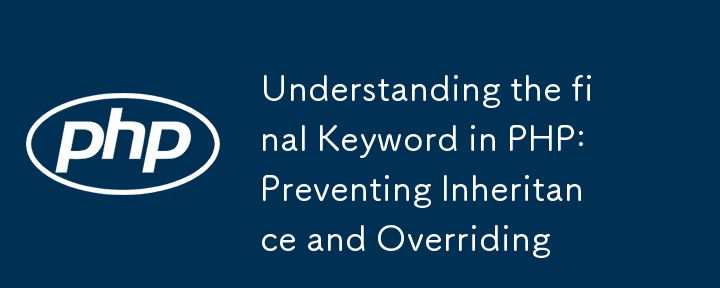Home >Backend Development >PHP Tutorial >Understanding the final Keyword in PHP: Preventing Inheritance and Overriding
Understanding the final Keyword in PHP: Preventing Inheritance and Overriding
- 王林Original
- 2024-09-10 22:33:03639browse

Introduction
When working with Object-Oriented Programming (OOP) in PHP, controlling the inheritance of classes and methods is essential for maintaining stability and security in your code. PHP provides the final keyword to prevent a class from being inherited or a method from being overridden in a subclass. This article will explore how and when to use the final keyword, along with practical examples.
1. What is the final Keyword?
The final keyword in PHP serves two key purposes:
- Final Class: A class declared as final cannot be extended (inherited).
- Final Method: A method declared as final cannot be overridden by any class that inherits it.
2. Why Use the final Keyword?
There are several reasons why you might want to use the final keyword:
- Prevent Inheritance: In some cases, you may want to prevent a class from being extended. This is common in security-critical or framework-based classes where the behavior should remain fixed.
- Method Locking: If a specific method in a class should not be overridden, marking it as final ensures that no derived class can change its behavior.
3. Declaring a Final Class
A final class cannot be extended. If another class attempts to extend a final class, PHP will generate an error.
final class Database {
public function connect() {
// Connection logic
}
}
// This will cause an error
class MySQLDatabase extends Database {
// Error: Cannot extend final class
}
When to Use a Final Class
Use the final keyword when you have a class that you do not want to be altered through inheritance. This is often the case for:
- Utility classes: That provide helper functions.
- Core framework classes: To prevent unwanted modifications.
4. Declaring a Final Method
A method within a class can be declared as final, preventing subclasses from overriding it. However, the class containing the final method can still be extended.
class PaymentGateway {
public final function processPayment() {
// Payment processing logic
}
}
class PayPalGateway extends PaymentGateway {
// This will cause an error
public function processPayment() {
// Error: Cannot override final method
}
}
When to Use a Final Method
Final methods are useful when you want to ensure that a particular functionality remains unchanged, even if the class is extended. For example:
- Security-sensitive methods: Where overriding could compromise the integrity of the code.
- Core logic in a base class: That should not be tampered with in subclasses.
5. Practical Examples of Using the final Keyword
Example 1: Securing Core Functionality in a Framework
In many frameworks, core components are marked as final to prevent developers from altering fundamental behavior.
final class FrameworkCore {
public function run() {
// Core logic for running the framework
}
}
Example 2: Final Methods in E-commerce Systems
In an e-commerce system, a final method can be used to prevent altering critical payment logic.
class Order {
public final function placeOrder() {
// Place order logic
}
}
6. Conclusion
The final keyword is a powerful tool in PHP’s object-oriented programming model. It provides control over class and method inheritance, ensuring that core functionality remains secure and unchanged. By using final, you can create robust, predictable applications that resist unwanted modifications. Use it wisely, especially when working on frameworks, libraries, or systems where stability is critical.
The above is the detailed content of Understanding the final Keyword in PHP: Preventing Inheritance and Overriding. For more information, please follow other related articles on the PHP Chinese website!

